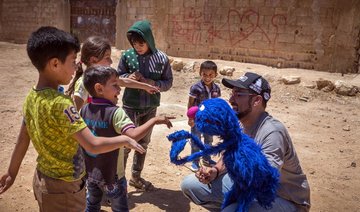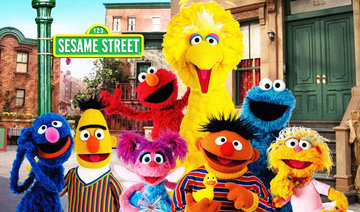DUBAI: As “Sesame Street” celebrates its 50th anniversary, many Arabs are looking back on the influence that the show had on them throughout their childhood, particularly the Arabic version, “Iftah Ya Simsim,” which began 40 years ago.
“I grew up watching both Sesame Street and Iftah Ya Simsim,” said Ammar Sabban, a 40-year-old Saudi who spent his first three years in the US. “I was mesmerized by how these characters functioned and I was intrigued by their mechanism. I always wanted to be a part of that world and try to see it for myself.”
His curiosity was so strong that it drew the former architect toward being a part of the Arabic show. As a result, two years ago Sabban started giving life to Cookie Monster, Grover, Burt and the Count as captain puppeteer, while assuming the role of creative content director at Bidaya Media.
“I’m living out my childhood dream,” he said. “Being part of the team and creating it came full circle because I spent most of my time watching these cartoons. I feel I am helping to create the same things I used to watch for younger generations.”
It all began in the US in 1969, when colorful muppets were created to teach young children in a playful manner, while preparing them for school. Ten years later, in 1979, “Iftah Ya Simsim” was born as the Arabic version of the show, which aired in 22 Arabic-speaking countries. Although it was pulled off the air in 1990 after the outbreak of the Gulf War, its new series started in September 2015, with the present show led by the Abu Dhabi Education Council, Twofour54, the Arab Bureau of Education for the Gulf States and Bidaya Media.
“Iftah Ya Simsim was a really exciting part of my day when I was child,” said Ruba Awni, a 31-year-old Palestinian who grew up in Jordan. “I felt like I was going to another place where fun and imagination would run free. I always thought that they lived in a real neighborhood nearby.”
Awni said Anis and Badr — also known as Bert and Ernie on “Sesame Street” — were her favorite characters. “I loved them then and I still love them today,” she said. “I remember when my dad would keep telling me stories about them, and how Anis was the smart one and Badr was the silly one. I even watched all the new episodes with my children — it’s amazing to watch it in HD, but the older version will always hold a special place in my heart.”
Created by Joan Ganz Cooney and Lloyd Morrisett, “Sesame Street” has had a massive impact on children and adults alike.
Since its comeback in the Middle East, the show has now entered its third season. For Sabban, “Iftah Ya Simsim” is all about fun learning — a crucial point for him, as he grew up loathing school. “I still hate school,” he joked. “But at the same time, I love learning, and these shows educated and entertained me simultaneously. I found out about the entertainment aspect first, then the educational part without knowing.”
“I love to teach and analyze but not in the traditional way,” he said. “I tried to do it, and I wasn’t happy with it, so I felt that this is maybe my way. Being able to write and perform comedy, and educate at the same time is a trifecta.”
Over the years, he was able to share his passion for the show with his three children. “I used to sit and watch shows with them, and do the voices,” he said. “But never in my wildest dreams did I ever think I would actually do it. They know the characters. They like the sense of humor, but they don’t watch it as much now because they have reached their teenage years.”
Content Themes Reports Settings Support Video Platform Welcome Mahad Mohamed CONTENT FOR SRPC - Arabnews Filter Total : 199 Drop files here Version: 5.0.17 © 2019 Limelight Networks. All rights reserved. limelight.com Suggestions? EMBED Theme Widescreen
A trailer of Iftah Ya Simsim’s Season 3, which features Sheikh Abdulla bin Mohamed Al-Hamed, chairman of the Department of Health of Abu Dhabi.
At the studio, Sabban and his team are working toward also making the show appealing to parents. “It’s part of why Sesame Street survived for 50 years, because the writing appealed to both children and adults, and the jokes and situations are timeless. We have very few children’s shows on TV in the Arab world that are appealing to parents at the same time, so that’s what we’re trying to do here.”
For Hala Khalaf, a 38-year-old Jordanian who grew up in Kuwait, “Iftah Ya Simsim” evokes feelings from her childhood; she recalls standing in her crib at the sound of the theme song. “I remember how much my brother and I used to look forward to it and watch it religiously,” she said. “Every one of the characters feels like an old friend — you can’t grow up in Kuwait in the 1980s without being a huge fan..”
When the show returned a few years ago, she watched the first episode with her daughter. “I get a lump in my throat when I hear the theme song because it’s associated with so many good childhood memories,” she said. “It’s a song ingrained in my brain more than any other, and I’m hoping exposure to the show will improve my children’s Arabic.”
Growing up, Sami Ha Zen, a 32-year-old Indian, was allowed to watch one hour of TV a day, into which he would manage to fit “Iftah Ya Simsim.”
“I was an avid watcher of the show and it shaped my behavior a lot,” said Zen, who grew up in Sharjah. “I loved the playfulness and adults around me were too serious to play with. I was jealous of the kids in the show and wanted to be part of it. Muppets were the wonder I couldn’t understand.”
Today, his children opt to watch “Sesame Street” in English. “During my childhood, we had Channel 33, the only English one in Dubai,” he said. “So we had to embrace Arabic and that’s how I learnt. My parents often translated what was happening in the show, which helped me to learn better.”
Fifty years on, Sesame Workshop, the non-profit educational organization behind “Sesame Street,” has announced a year-long anniversary celebration. Throughout 2019, it will bring people together around the lessons of “Sesame Street” — that everyone is equally worthy of respect, opportunity and happiness.
“This is a remarkable milestone for kids, for education and for television,” said Jeffrey D. Dunn, Sesame Workshop’s chief executive officer. “Sesame Street has now brought the life-changing benefits of early learning to children around the globe for 50 years. Our mission is to help kids everywhere grow smarter, stronger, and kinder knows no geographic boundaries. We’re everywhere families are, and we never stop innovating and growing. That’s what keeps us timeless.”
Part of the celebration will include a 50th television season, which focuses on empowering children to take safe risks and learn from their mistakes, as well as a US road trip where “Sesame Street” characters host community events in 10 cities.
The Sesame Street in Communities initiative will tackle issues such as substance abuse and foster care to support vulnerable children and families, while the launch of a new local version of “Sesame Street” was created for displaced Syrian families and their new neighbors in Iraq, Jordan, Lebanon, and Syria, as part of a large-scale early childhood intervention in the region.
A November prime-time special will feature new takes on classic segments and visits from “Sesame Street” icons. “We’re often asked what Sesame Street’s legacy will be,” Cooney said. “To me, a legacy is when something’s over … and this isn’t over.”
For Morrisett, “Sesame Street” had a profound impact on children’s media, setting a template that the industry has followed for generations. “Fifty years later, Sesame Workshop continues to deliver on its mission every day, across multiple platforms, on six continents. We started as an experiment — and it worked.”































